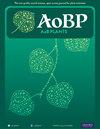Trait variation and performance across varying levels of drought stress in cultivated sunflower (Helianthus annuus L.)
IF 2.4
3区 生物学
Q2 ECOLOGY
引用次数: 0
Abstract
Background and Aims Drought is a major agricultural challenge that is expected to worsen with climate change. A better understanding of drought responses has the potential to inform efforts to breed more tolerant plants. We assessed leaf trait variation and covariation in cultivated sunflower (Helianthus annuus L.) in response to water limitation. Methods Plants were grown under four levels of water availability and assessed for environmentally induced plasticity in leaf stomatal and vein traits as well as biomass (performance indicator), mass fractions, leaf area, leaf mass per area, and chlorophyll content. Key Results Overall, biomass declined in response to stress; these changes were accompanied by responses in leaf-level traits including decreased leaf area and stomatal size, and increased stomatal and vein density. The magnitude of trait responses increased with stress severity and relative plasticity of smaller-scale leaf anatomical traits was less than that of larger-scale traits related to construction and growth. Across treatments, where phenotypic plasticity was observed, stomatal density was negatively correlated with stomatal size and positively correlated with minor vein density, but the correlations did not hold up within treatments. Four leaf traits previously shown to reflect major axes of variation in a large sunflower diversity panel under well-watered conditions (i.e., stomatal density, stomatal pore length, vein density, and leaf mass per area) predicted a surprisingly large amount of the variation in biomass across treatments, but trait associations with biomass differed within treatments. Additionally, the importance of these traits in predicting variation in biomass is mediated, at least in part, through leaf size. Conclusions Our results demonstrate the importance of leaf anatomical traits in mediating drought responses in sunflower, and highlight the role that phenotypic plasticity and multi-trait phenotypes can play in predicting productivity under complex abiotic stresses like drought.栽培向日葵(Helianthus annuus L.)在不同程度干旱胁迫下的性状变异和表现
背景和目的 干旱是农业面临的一大挑战,预计会随着气候变化而加剧。更好地了解干旱反应有可能为培育更耐旱的植物提供依据。我们评估了栽培向日葵(Helianthus annuus L.)的叶片性状变异和共变性对水分限制的响应。方法 在四种水分供应水平下种植向日葵,评估环境诱导的叶片气孔和叶脉性状的可塑性,以及生物量(性能指标)、质量分数、叶面积、单位面积叶片质量和叶绿素含量。主要结果 总体而言,生物量随胁迫而下降;伴随这些变化的是叶片级性状的反应,包括叶面积和气孔大小的减少以及气孔和叶脉密度的增加。性状反应的程度随胁迫严重程度而增加,较小范围的叶片解剖性状的相对可塑性小于与构造和生长相关的较大范围性状的可塑性。在观察到表型可塑性的所有处理中,气孔密度与气孔大小呈负相关,与次脉密度呈正相关,但在处理内部,这种相关性并不稳定。之前在一个大型向日葵多样性面板上显示的反映水分充足条件下主要变异轴的四个叶片性状(即气孔密度、气孔孔隙长度、叶脉密度和单位面积叶片质量)预测了各处理间生物量的大量变异,但各处理间性状与生物量的相关性各不相同。此外,这些性状在预测生物量变化方面的重要性至少部分是通过叶片大小来体现的。结论 我们的研究结果证明了叶片解剖学性状在向日葵干旱反应中的重要作用,并强调了表型可塑性和多性状表型在预测干旱等复杂非生物胁迫下的生产力方面所能发挥的作用。
本文章由计算机程序翻译,如有差异,请以英文原文为准。
求助全文
约1分钟内获得全文
求助全文
来源期刊

AoB Plants
PLANT SCIENCES-
CiteScore
4.80
自引率
0.00%
发文量
54
审稿时长
20 weeks
期刊介绍:
AoB PLANTS is an open-access, online journal that has been publishing peer-reviewed articles since 2010, with an emphasis on all aspects of environmental and evolutionary plant biology. Published by Oxford University Press, this journal is dedicated to rapid publication of research articles, reviews, commentaries and short communications. The taxonomic scope of the journal spans the full gamut of vascular and non-vascular plants, as well as other taxa that impact these organisms. AoB PLANTS provides a fast-track pathway for publishing high-quality research in an open-access environment, where papers are available online to anyone, anywhere free of charge.
 求助内容:
求助内容: 应助结果提醒方式:
应助结果提醒方式:


